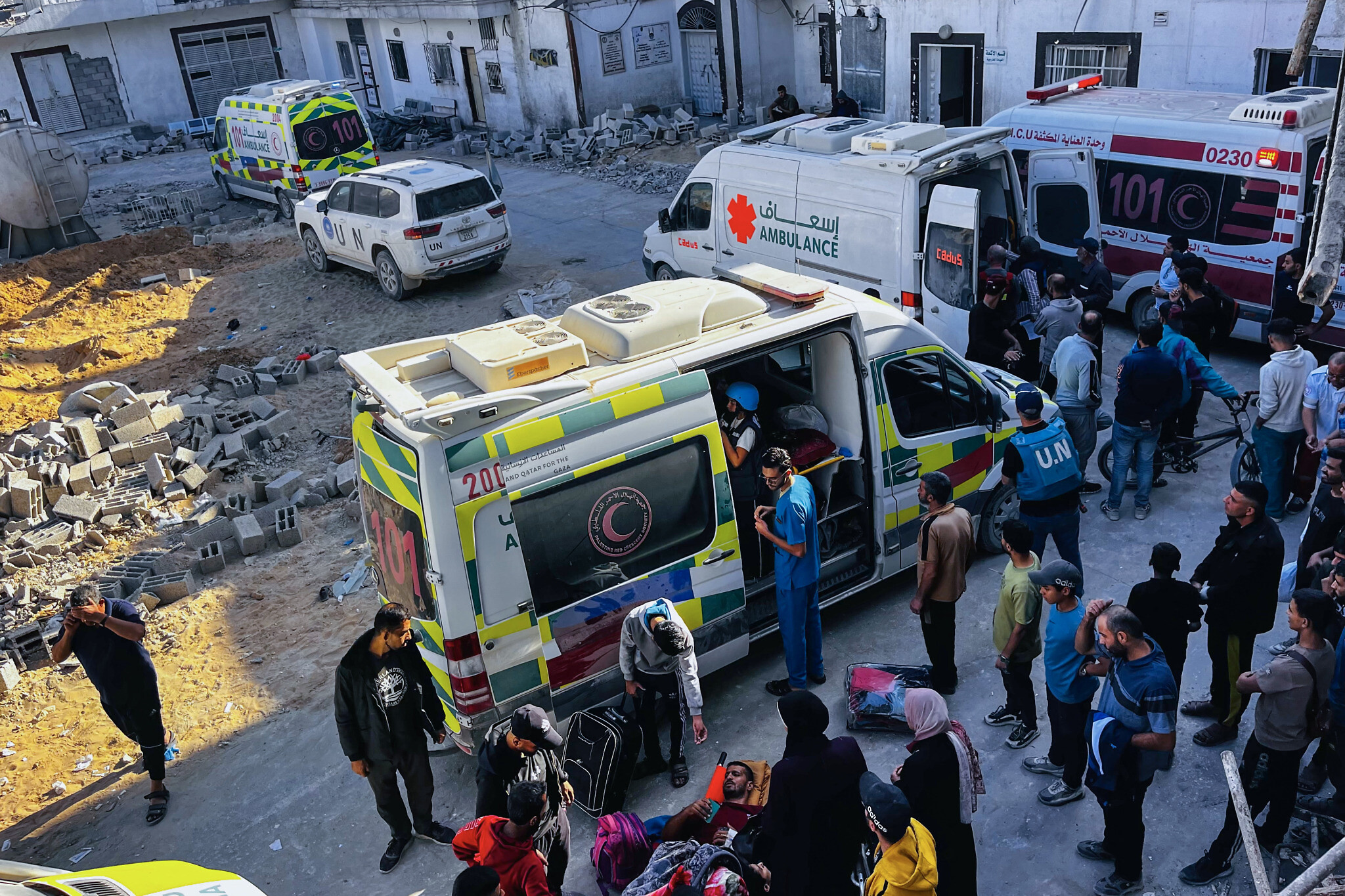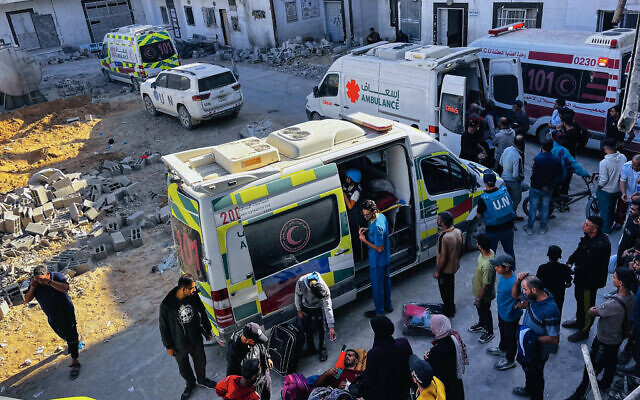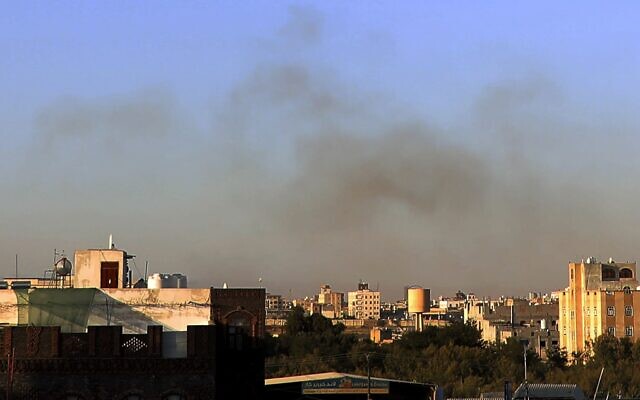



The Times of Israel is liveblogging Saturday’s events as they unfold.
Poll: Israelis sour on PM and ministers, more than 2/3 give government failing score
A Channel 12 poll held ahead of the government’s two-year anniversary on Sunday finds that 68 percent of the public disapprove of its performance, as opposed to just 26% who approve and six percent who say they didn’t know.
Even among those who voted for coalition parties in the previous election, only 53% say they approved of the government’s performance, compared to 37% who disapproved.
Among the general public, the unfavorables of Netanyahu and every government minister were higher than their respective favorables.
Sixty-one percent say Netanyahu is doing a bad job, 34% think he is doing a good job, and 5% didn’t know.
Among the premier’s voters, the figures shift to 26% disapproval and 68% disapproval, with six percent of respondents unsure.
The minister with the highest disapproval rating is Finance Minister Betzalel Smotrich, whose Religious Zionism party has struggled to cross the electoral threshold in recent surveys. In the Channel 12 poll, 70% of respondents describe Smotrich’s job performance as “bad,” 20% as “good” and 10% say they don’t know.
Transportation Minister Miri Regev scores 68% “bad” and 19% “good” with 13% saying they don’t know; National Security Minister Itamar Ben Gvir — 64% “bad” and 28% “good,” with 8% saying they don’t know; Housing Minister Yitzhak Goldknopf — 62% “bad” and 15% “good,” with 23% saying they don’t know; Justice Minister Yariv Levin — 61% “bad” and 25% “good,” with 14% saying they don’t know; Education Minister Yoav Kisch — 59% “bad” and 20% “good,” with 21% saying they don’t know; Regional Cooperation Minister David Amsalem — 58% “bad” and 17% “good,” with 25% saying they don’t know; Economy Minister Nir Barkat — 58% “bad” and 23% “good,” with 19% saying they don’t know; Communications Minister Shlomo Karhi — 56% “bad” and 22% “good,” with 22% saying they don’t know; and Foreign Minister Gideon Sa’ar — 55% “bad” and 22% “good,” with 23% saying they don’t know.
The ministers with the lowest gap between their approval and disapproval ratings are: Interior Minister Moshe Arbel, whose job performance was described by 37% of respondents as “bad” and 35% as “good,” with 28% saying they don’t know; Defense Minister Israel Katz, who receives 50% “bad” and 31% “good,” with 19% saying they don’t know; and Culture Minister Miki Zohar — 45% “good” and 30% “bad,” with 25% saying they don’t know.
All ministers had a higher disapproval than approval rating in the poll, Channel 12 says. According to the network, six ministers even score a negative approval margin among Netanyahu supporters: Kisch, Regev, Smotrich, Goldknopf, Barkat and Environmental Protection Minister Idit Silman. However, Channel 12 does not provide the breakdown of these ministers’ support among the premier’s partisans.
The survey also finds that among all respondents, National Unity chair Benny Gantz holds a slight lead over his second-in-command, MK Gadi Eisenkot, on the question of which of the two opposition lawmakers is a better fit for prime minister: 25% say Gantz, 23% say Eisenkot, 41% say neither and 11% say they don’t know.
Among supporters of the opposition, however, Eisenkot leads Gantz 38%-30%, with 22% saying neither and 10% saying they don’t know.
The poll was conducted by Mano Geva’s Midgam polling company in cooperation with the iPanel online research firm. Channel 12 does not provide the poll’s sample size or margin of error.
Jordan, UAE, Saudi Arabia condemn Israeli operations in north Gaza hospital
Arab states rush to condemn Israeli operations in a north Gaza hospital after Hamas-run health officials claimed troops stormed the facility and set fire to it.
The IDF has denied what it called “unsubstantiated reports.”
Jordan’s foreign ministry says Amman “condemns in the strongest terms the burning of Kamal Adwan Hospital in the northern Gaza Strip by the Israeli occupation forces, and forcing patients and medical staff to evacuate it.”
The statement adds that the reported Israeli military actions come ” in a flagrant violation of international law and international humanitarian law.”
A statement from the United Arab Emirates foreign ministry echoes the Jordanian statement, stressing Abu Dhabi’s “categorical rejection of this heinous act that violates international humanitarian law, and the systematic and reprehensible destruction of the remaining health system in the Strip.”
Saudi Arabia also issues a statement decrying the Israeli operations and claiming they violate “international law, international humanitarian law, and the most basic humanitarian and ethical standards.”
Earlier this evening, IDF spokesperson Lt. Col. Nadav Shoshani denied Hamas claims that Israeli troops stormed and set fire to the Kamal Adwan Hospital in northern Gaza and said that a preliminary investigation found “no connection” between military activity and the fire.
IDF denies Hamas claims troops stormed, set fire to Kamal Adwan Hospital in northern Gaza

IDF spokesperson Lt. Col. Nadav Shoshani denies Hamas claims that Israeli troops stormed and set fire to the Kamal Adwan Hospital in northern Gaza.
“While IDF troops were not in the hospital, a small fire broke out in an empty building inside the hospital that is under control,” he says, adding that a preliminary investigation has found “no connection” between military activity and the fire.
“Running with unsubstantiated reports on the cause of this fire shows nothing but questionable journalistic integrity,” he adds.
The Hamas-run health ministry in Gaza claims Israeli troops entered the facility in Beit Lahiya and forced many staff and patients outside to strip in winter weather.
It also says Israeli troops also set fires in several parts of Kamal Adwan, including the lab and surgery department, and that 25 patients and 60 health workers remain in the hospital.
The account can not be independently confirmed, and attempts to reach hospital staff have been unsuccessful.
The IDF says it was conducting operations against Hamas infrastructure and operatives in the area and had ordered people out of the hospital, but that it had not entered the complex as of this evening.
The military, which last operated against Hamas at the hospital in October, said earlier today that the facility had “once again become a key stronghold for terrorist organizations and continues to be used as a hideout for terrorist operatives.”
The IDF also said it had “facilitated the secure evacuation of civilians, patients, and medical personnel prior to the operation” to mitigate civilian harm.
Since October 6, Israel has intensified its land and air offensive in northern Gaza, stating its goal is to prevent Hamas terrorists from regrouping in the area.
Hamas has fought from within hospitals throughout the war and even periodically hid some of the Israeli hostages kidnapped in its October 7, 2023, massacre inside. International law prohibits targeting hospitals during wartime, but hospitals can lose this protection if used for military purposes.
UN official denies Israeli claim Yemen airport targeted in airstrike has military use

The top UN official for humanitarian aid in Yemen, who narrowly dodged an Israeli airstrike on Sanaa’s airport yesterday, denies that the facility has any military purpose.
Israel said that it was targeting “military infrastructure” in the raids and that targets around the country were used by Houthis to “smuggle Iranian weapons” and bring in senior Iranian officials. The strikes came in response to repeated ballistic missile and drone attacks on Israel which have ramped up in recent weeks.
UN humanitarian coordinator Julien Harneis says the airport “is a civilian location that is used by the United Nations.”
“It’s used by the International Committee of the Red Cross, it is used for civilian flights –- that is its purpose,” he tels reporters by video link from Yemen.
“Parties to the conflict have an obligation to ensure that they are not striking civilian targets,” he adds. “The obligation is on them, not on us. We don’t need to prove we’re civilians.”
Harneis describes how he, World Health Organization chief Tedros Adhanom Ghebreyesus, and 18 other UN staff, were caught up in the attack, which he says also took place as a packed airliner was touching down nearby.
One UN staffer was seriously wounded in the strikes, which destroyed the air traffic control facility, Harneis says. The rest of the team was bundled into armored vehicles for safety.
“There was one airstrike approximately 300 meters (985 feet) to the south of us and another airstrike approximately 300 meters to the north of us,” he said.
“What was most frightening about that air strike wasn’t the effect on us -– it’s that the air strikes took place… as a civilian airliner from Yemenia Air, carrying hundreds of Yemenis, was about to land,” he says.
“In fact, that airliner from Yemenia Air was landing, taxiing in, when the air traffic control was destroyed.”
Although the plane “was able to land safely… it could have been far, far worse.”
He says the Israeli strike came with “zero indication of any potential air strikes and that the airport is “absolutely vital” to continued humanitarian aid for Yemen. “If that airport is disabled, it will paralyze humanitarian operations.”
The United Nations has labeled Yemen “the largest humanitarian crisis in the world,” with 24.1 million people in need of humanitarian aid and protection.
